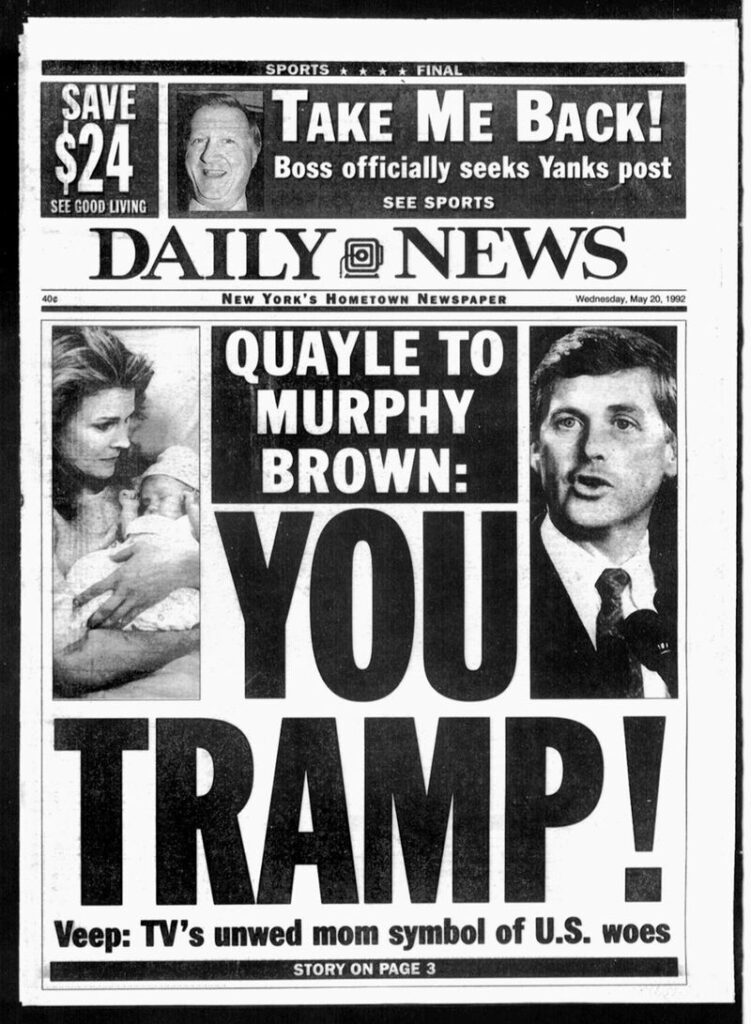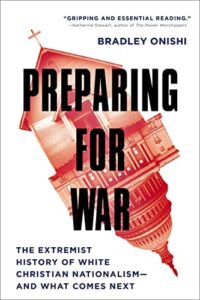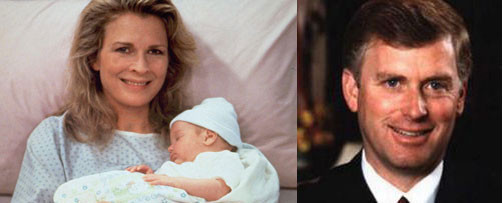Single Mothers, Sex, and Christian Nationalism
An excerpt from the forthcoming book Preparing for War: The Extremist History of White Christian Nationalism—And What Comes Next

(Image: New York Daily News cover, May 20, 1992)
The following excerpt comes from Bradley Onishi’s forthcoming book Preparing for War: The Extremist History of White Christian Nationalism—and What Comes Next, reprinted here with permission from Broadleaf Books copyright © 2023. The book explores the rise of White Christian nationalism over the past several decades leading up to the January 6, 2021 assault on the United States Capitol.
The excerpt is from the book’s sixth chapter, “The Pure American Body.”
***
There was a lot riding on that kiss. More than usual for the first intimate moment of a high school romance. We knew it, too. Our relationship depended on it. Our families’ futures depended on it. More than anything, the fate of our nation depended on it.
 One of the benefits of being a zealous teenage convert to evangelicalism is that your parents stop worrying about what’s happening behind your closed bedroom door when your girlfriend comes over. After dozens of Bible studies, prayer groups, and Christian concerts, they kind of just turn off the normal teenage-radar and let you do your thing. So when Alexis and I went up to my room at eleven that Friday night—me a high school senior, her a freshman in college—no one in my family even blinked. We’d been dating for almost three years by then and had done little more than hold hands and hug goodbye. Like me, she was a convert who took her faith to the extreme. We were an even match when it came to our devotion to God, to evangelism, and to cultivating a life marked by godly virtues such as patience, integrity, and, most of all, purity.
One of the benefits of being a zealous teenage convert to evangelicalism is that your parents stop worrying about what’s happening behind your closed bedroom door when your girlfriend comes over. After dozens of Bible studies, prayer groups, and Christian concerts, they kind of just turn off the normal teenage-radar and let you do your thing. So when Alexis and I went up to my room at eleven that Friday night—me a high school senior, her a freshman in college—no one in my family even blinked. We’d been dating for almost three years by then and had done little more than hold hands and hug goodbye. Like me, she was a convert who took her faith to the extreme. We were an even match when it came to our devotion to God, to evangelism, and to cultivating a life marked by godly virtues such as patience, integrity, and, most of all, purity.
Though we planned to marry soon after I graduated high school, we decided that it would be best to have our first kiss intentionally, in a planned and disciplined way rather than a spur-of-the-moment temptation that could lead us down a lustful path.
According to the historian Sara Moslener, in April of 1993 the first True Love Waits Pledges were taken at a Southern Baptist conference at a local church in Texas. This was the Southern Baptist Convention’s test pilot of the program. It soon spread to other local churches throughout the denomination. The first rally was in 1994 in Washington, DC. At the gathering, evangelical luminaries delivered message after message to the teenagers in attendance that the most important part of their personal walk with God was remaining sexually “pure” before marriage. At the end of the rally, there was an altar call—a standard feature of evangelical meetings, going back to the Second Great Awakening. But this one was different. The call was to pledge oneself to a life of purity. Those who answered the call signed cards that were later delivered to the National Mall in Washington, DC.
My Straight White American Jesus podcast cohost Dan Miller pledged his purity on a True Love Waits card at his church in Colorado. For him, it was a promise to keep his mind and body free of sexual sin and to be part of a generation who would turn American culture around. His card was delivered to the National Mall in 1994. There was a clear message behind sending hundreds of thousands of cards to the nation’s capital: the pledge to develop and maintain pure teenage bodies was a pledge not only to obey God’s commands but to build national strength and integrity. Somehow, there was a connection between nation-building and the sexual abstinence of teenagers in Milwaukee and Tucson and Baton Rouge. By the time the cards were delivered in July 1994, more than two hundred thousand teenagers like Dan had pledged their commitment to be part of a new generation of young people willing to stand up for God, rage against the cultural tides, and say no to sexual licentiousness.

(Image: True Love Waits purity ring and prayer. Source: Medium.com)
When I converted soon thereafter, the currents of purity culture, as manifest in the True Love Waits movement, were sweeping through evangelical churches. On the surface, the message was straightforward. It went something like this: Since the 1960s, we have lived in a culture that celebrates sexual freedom in destructive ways. By obeying God and committing yourself to abstinence before marriage, you are a countercultural rebel who is going to have a loving, intimate, and healthy sex life once you enter the bonds of marriage. The emphasis, as usual in evangelicalism, was on individual piety. We were warned that sex outside of God’s plan would destroy us spiritually and physically. The inflictions would be swift and ferocious—depression, anxiety, low self-esteem, not to mention AIDS and syphilis. And unlike other sins, which God washed away as soon as we confessed, sexual sins would wreak permanent damage on ourselves and our marriage.
“See this piece of tape?” one of our youth leaders would say in front of the crowd at Bible study. “What happens when I put it on Jesse’s arm?” He would put the tape on Jesse and then rip it off, leading to a yelp from the poor volunteer and roaring laughter from the crowd. “Now, when I put the same piece of tape on Ben, it has lost its grip.” The sequence would continue down a line of volunteers on stage until the tape was mangled and thrown into the trash. “This is what your sexuality is like. If you keep attaching yourself physically to people, eventually you will be used up and thrown away.”
These lessons made me afraid. Unlike other sins, which would be forgiven and washed away by Christ, it seemed that sexual sin had lasting effects even after you repented. I had already experimented with sex before my conversion. In order to be right with God and ready for marriage, I decided that antisex militancy was the only path that would work. Alexis and I decided early on in our dating relationship that we wouldn’t kiss until marriage. In our minds, kissing would lead to more kissing, which would lead to temptations we didn’t want to have to face.
But as time went on, it became clear that there was more to the purity message than not giving in to bodily lust. Keeping our bodies pure was the way to renewing the purity of other bodies. Both Alexis and I had divorced families—“broken homes,” as they were known in evangelical circles. Few, if any, of our relatives were born-again Christians like we were. If we wanted to turn the generational ship around in order to create a family tree of God-fearing people, the first step was maintaining our relationship’s purity as the foundation for a pious genealogical legacy. The family is the vessel of godly instruction and formation, we learned. If the tree’s roots were rotten, how could we expect our children and their children to ever love God and find eternal salvation?
As young people, we knew that the stakes of individual purity extended even beyond the fate of our families to the fate of our nation. If we wanted to restore America’s glory, it would take a generation of godly families rooted in the pledge to purity. It would require seeing a connection between the purity of our teenaged bodies and purity of our body politic. As those massive mailings of purity pledge cards to the National Mall from that first rally suggest, True Love Waits was more than a movement to get kids to stop fooling around at Inspiration Point or prevent teen pregnancy. The organizers sent a clear message to our generation: sexual purity is the road to national renewal. It’s the frontline of the culture wars. And you are the soldiers.
Vice Presidents and Single Mothers
According to evangelical leaders during the eighties and early nineties, in order to see the rot creeping into American culture, all you had to do was turn on the television. While family-oriented programs like The Cosby Show and Family Ties still dominated the air-waves, these years also saw new representations of gender roles, sexual identities, and family types on the small screen. Three’s Company portrayed a supposedly gay man living with two women in the same apartment, and My Two Dads challenged conventional notions about healthy families and parental guidance. But the program that caused the most controversy was the ratings bonanza Murphy Brown, a show about a woman who decided to raise a child on her own while managing a successful career.
In 1992, then vice president Dan Quayle criticized Murphy Brown in a speech about family values: “Ultimately however, marriage is a moral issue that requires cultural consensus, and the use of social sanctions. Bearing babies irresponsibly is, simply, wrong. Failing to support children one has fathered is wrong. We must be unequivocal about this. It doesn’t help matters when prime time TV has Murphy Brown—a character who supposedly epitomizes today’s intelligent, highly paid, professional woman—mocking the importance of fathers, by bearing a child alone, and calling it just another ‘lifestyle choice.’”
Quayle links what he takes to be the decay of American culture to the breakdown of the nuclear family. He suggests that if single mothers who refuse partners and raise children without a male figure in the household are allowed to proceed without sanction, then the country will decline. By sounding this alarm, the vice president was tapping into a cultural current of the decay of White sexual ethics. In 1993, the libertarian author Charles Murray caused controversy when he published “The Coming White Underclass.” Murray begins the essay with a racist caricature of the Black American family characterized by out-of-wedlock children living in fatherless homes. He then paints with broad strokes to create a picture of Black life in urban areas as akin to “Lord of the Flies writ large,” where “the values of unsocialized male adolescents” are “physical violence, immediate gratification and predatory sex. That is the culture now taking over the black inner city.” In Murray’s mind there is a direct line between out-of-wedlock childbirth and social chaos. Even more frightening for Murray were the statistics that revealed that White Americans were having children out of wedlock at increasing rates. In Murray’s analysis, there is a one-to-one correlation between the destitution of Black life and the percentage of children born out of wedlock. If the number of “illegitimate” White children reached the same level, he suggested, it would create a White underclass similar to that of Black America. His concerns about marriage, sexual ethics, and the nuclear family were rooted in racist tropes about Black people and Black families.

(Left: Murphy Brown. Right: Dan Quayle)
Dan Quayle was nowhere near as controversial as Murray, but his thinking followed similar pathways. For Quayle, the route to national renewal was the nuclear family. Americans must return to the family values, which, for Christian nationalists, are the locus keeping the country connected to God: “So I think the time has come to renew our public commitment to our Judeo-Christian values—in our churches and synagogues, our civic organizations and our schools. We are, as our children recite each morning, ‘one nation under God.’ . . . If we lived more thoroughly by these values, we would live in a better society.”
The writers of Murphy Brown didn’t take the criticism lying down. In the opening episode of the following season, the main character, who is a newscaster, says into the fictional camera: “These are difficult times for our country, and in searching for the causes of our social ills we could choose to blame the media, or the Congress, or an administration that’s been in power for twelve years. Or we could blame me.”
Murphy Brown was singled out because the character represented multiple aberrations from the family structure and sexual ethics that Christian nationalists view as essential to American prosperity. She is a professional who prioritizes her career. She is a single woman who has autonomy over her sex life. She is a single mother who is intentionally raising her child without a male partner. To top it off, in the show Murphy Brown is a role model to others—a newscaster whose life and work are showcased on national television.
The show’s writers astutely identified the issue that Quayle and his ilk had with the character and the show. In Christian nationalists’ minds, there is a direct connection between “impure” sexual practices and “broken” family structures and the fate of the nation. They condemn the likes of Murphy Brown because they see in her character a representation of the sexual and familial waywardness they blame for destroying the nation from within. The fate of the nation depends, for the Christian nationalist, on sexual purity and proper familial structure. Without those, their story goes, we will be a nation of fatherless boys lacking proper masculine virtues and a society overrun by violence, aggression, and chaos.
Bradley Onishi is a scholar of religion and host of the Straight White American Jesus podcast. His book, Preparing for War: The Extremist History of White Christian Nationalism—And What Comes Next, will be published by Broadleaf Books in January 2023.